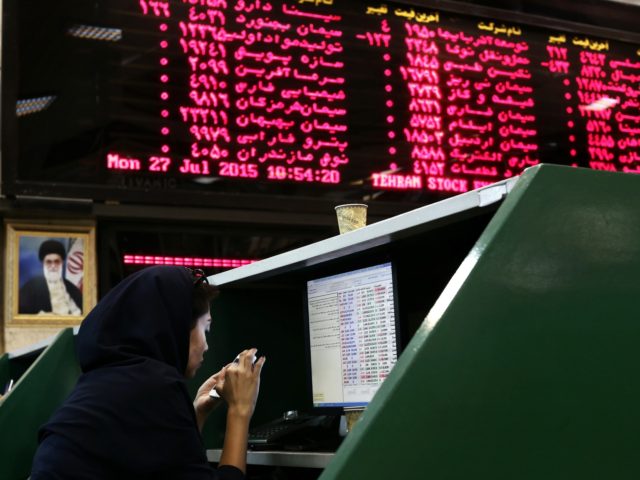The U.S. Treasury Department announced sanctions against 18 major Iranian banks Thursday, one of them directly affiliated with the Iranian military.
Treasury Secretary Steven Mnuchin said the action “reflects our commitment to stop illicit access to U.S. dollars.”
“Our sanctions programs will continue until Iran stops its support of terrorist activities and ends its nuclear programs. Today’s actions will continue to allow for humanitarian transactions to support the Iranian people,” Mnuchin said.
The Treasury Department noted the sanctions have no effect on “existing authorizations and exceptions for humanitarian trade, which remain in full force and effect for these seventeen banks.”
The Iranian regime and its apologists frequently blame U.S. sanctions for the appalling humanitarian conditions in Iran. Iranian Foreign Minister Mohammad Javad Zarif made another attempt to do so on Thursday:
Amid Covid19 pandemic, U.S. regime wants to blow up our remaining channels to pay for food & medicine.
Iranians WILL survive this latest of cruelties.
But conspiring to starve a population is a crime against humanity. Culprits & enablers—who block our money—WILL face justice. pic.twitter.com/n0fnXPNik8
— Javad Zarif (@JZarif) October 8, 2020
Oddly, Iran seems to have plenty of money to waste on the nuclear weapons research it promised the world it would not conduct, even as the regime claims it cannot afford food and medicine for its people. Iran has been steadily ramping up its violations of the nuclear deal and increasing its stockpile of enriched uranium, even as the government in Tehran cries poverty and blames the United States for its economic decline.
“Today’s action targets the Iranian regime and is not directed at the people of Iran. The U.S. government recognizes and understands the necessity for both commercial humanitarian exports and humanitarian transactions to access Iran’s banking system, and this action does not interfere with that ability,” the Treasury Department stated.
Treasury listed the 18 banks affected by its action and noted the special circumstances surrounding two of them:
Amin Investment Bank, Bank Keshavarzi Iran, Bank Maskan, Bank Refah Kargaran, Bank-e Shahr, Eghtesad Novin Bank, Gharzolhasaneh Resalat Bank, Hekmat Iranian Bank, Iran Zamin Bank, Karafarin Bank, Khavarmianeh Bank (also known as Middle East Bank), Mehr Iran Credit Union Bank, Pasargad Bank, Saman Bank, Sarmayeh Bank, Tosee Taavon Bank (also known as Cooperative Development Bank), and Tourism Bank were previously identified as Iranian financial institutions pursuant to E.O. 13599. Today, they were sanctioned as entities operating in Iran’s financial sector.
Additionally, Islamic Regional Cooperation Bank, also previously identified as an Iranian financial institution under E.O. 13599, was sanctioned pursuant to E.O. 13902 for being owned or controlled by Eghtesad Novin Bank.
In May 2020, Hekmat Iranian Bank, a bank servicing Iran’s armed forces, merged with Bank Sepah, which has served as a financial platform for Iran’s Ministry of Defense and Armed Forces Logistics (MODAFL) to pay its agents abroad. Bank Sepah was designated on November 5, 2018 pursuant to E.O. 13382 for having provided support to MODAFL. Today, Hekmat Iranian Bank was also designated pursuant to E.O. 13382, as an entity owned or controlled by Bank Sepah.
All of these institutions are subordinate to the Central Bank of Iran, sanctioned in September 2019 for supporting the Islamic Revolutionary Guard Corps (IRGC), a designated terrorist organization.
“Most of Iran’s financial sector has already been sanctioned, including its central bank. But proponents say that the action could financially asphyxiate the regime by freezing the few foreign currency flows the economy still has and needs to import goods needed to prevent a collapse,” the Wall Street Journal commented on Thursday.
The Trump administration announced on Monday a host of sanctions against Iran aimed at continuing a conventional weapons ban that is set to expire, amid the start of the annual U.N. General Assembly. https://t.co/xVQWjKHQcX
— Breitbart News (@BreitbartNews) September 22, 2020
“With a consensus growing among U.S. analysts that Iran wouldn’t likely mount an attack ahead of the U.S. election, ranking Republican senators and Iran-policy hawks outside the administration called for the White House to levy new sanctions. The Iranian rial subsequently plumbed record lows in recent weeks,” the Journal added.
Bloomberg News quoted “people familiar with planning for the sanctions” who said the two objectives of the new Treasury sanctions are to “close one of the few remaining financial loopholes allowing Iran’s government to earn revenue, and stymie Democrat Joe Biden’s promise to re-enter the nuclear deal if he wins the presidency next month.”

COMMENTS
Please let us know if you're having issues with commenting.